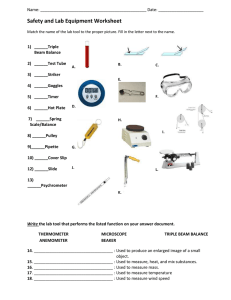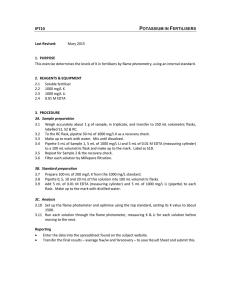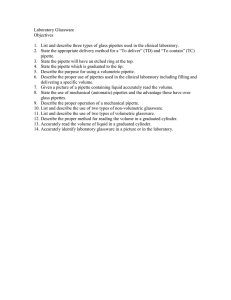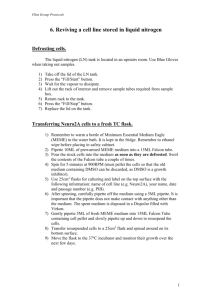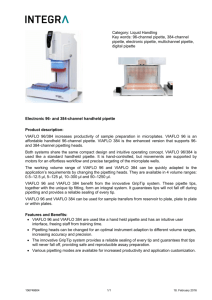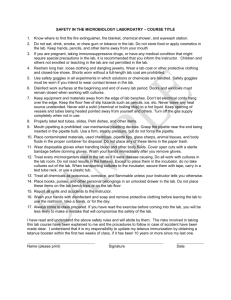Laboratory Equipment
advertisement
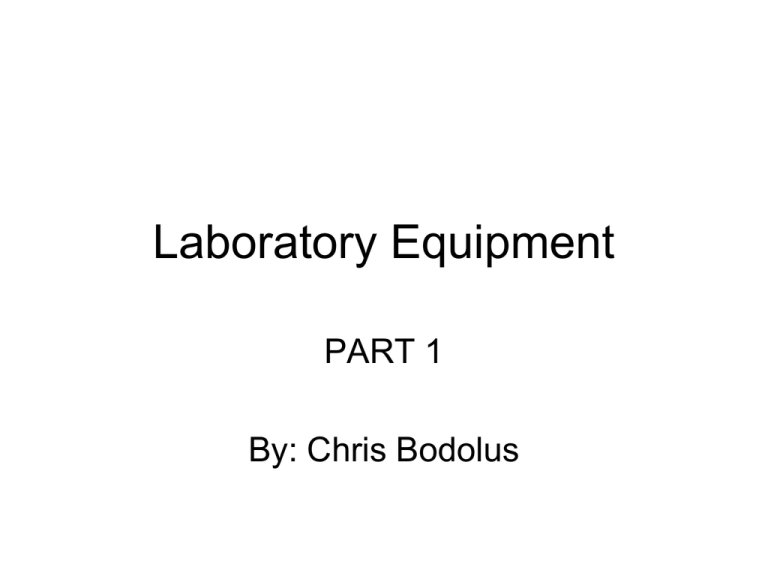
Laboratory Equipment PART 1 By: Chris Bodolus 1. Volumetric Flask A flask calibrated to contain or to deliver a definite amount of liquid. 2. Erlenmeyer Flask A piece of chemistry laboratory equipment, a container often made of glass, which has a narrow cylindrical mouth and a cone-shaped main body that ends in a wide, flat bottom. 3. Florence Flask A globular long-necked bottle of thin glass used for holding water or other liquid in laboratory work. 4. Volumetric Pipette A pipette used to measure a particular volume to high accuracy, the last drop should not be blown out, put the tip against the beaker and rotate a half twist. 5. Serologic Pipette A pipette with a plain, narrow tube drawn out to a tip and graduated uniformly along its length. Calibration marks extend to the tip. 6. Ostwald Pipette A pipette is similar to the volumetric transfer pipette, except that the last drop should be blown out. 7. Mohr Pipette A pipette with a plain, narrow tube drawn out to a tip and graduated uniformly along its length. Calibration marks are confined to the stem. 8. Plastic Pipette A small pipette used to transfer small amount of substances. Not very accurate. Small bulb at top made outof plastic. 9. Pasteur Pipette A tapered glass pipette commonly used in laboratories. 10. Beaker A thin glass vessel, with a lip (beak) for pouring, used as containers for liquids. 11. Graduated Cylinder A measuring instrument for measuring fluid volume; a glass container (cup or cylinder or flask) whose sides are marked with or divided into amounts. 12. Reagent Bottle A bottle used to mix or store reagents. 13. Test Tube Rack A rack used to hold test tubes upright. 14. Petri Dish A shallow circular dish with a loose-fitting cover, used to culture bacteria or other microorganisms. 15. Wire Loop A small loop made from wire protruding from a small stick used to hold small items over a flame. 16. Disposable Loop A small loop made from plastic used to hold small items over a flame, is disposable. 17. Pipette Bulb A device that is used to provide suction to draw the liquid up into the pipette. 18. Forceps A hand-held instrument used for grasping and holding objects. 19. Funnel A conically shaped pipe, employed as a device to channel liquid or fine-grained substances into containers with a small opening. 20. Blood Typing Slide A slide that holds blood when mixed with other substances to determine the type of blood. 21. Test Tubes A clear, cylindrical glass tube usually open at one end and rounded at the other, used in laboratory experimentation. 22. Kimwipe (type of paper towel) A type of paper towel designed to remove liquids and dust from the most critical or delicate surfaces. They're made from a finely textured singleply tissue that's highly absorbent and nonabrasive. 23. Triple Beam Balance A single-pan weighing instrument that has three beam each of which measures different amounts. The first beam measures in multiples of 10 from 0 – 100. The second beam measures in multiples of 50 or 100 from 0 – 500. The third beam measures from 0.00 – 10.00. The devise is used manually. 24. Double Pan Balance A double-pan weighing instrument used to determine the difference in mass between two objects. The devise is used manually. 25. Analytical Balance An electronic balance of great precision used in quantitative chemical analysis.
